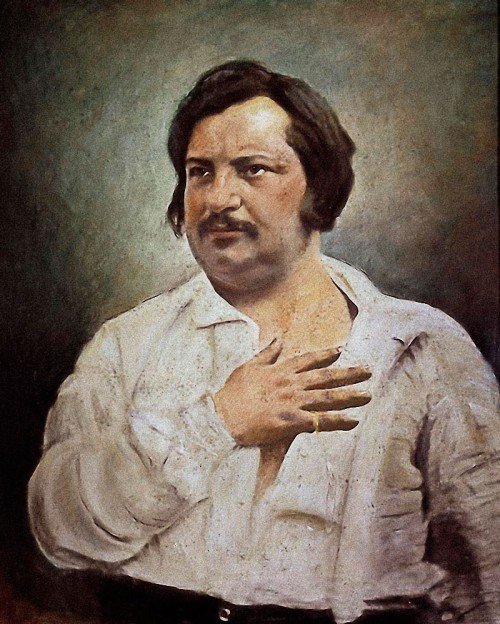
Honore de Balzac: The Master of Realism
Honore de Balzac was a French novelist and playwright who lived in the 19th century. He is considered one of the greatest writers in European literature and is often credited with pioneering the genre of realism. Balzac's work portrays the society of his time in great detail, focusing on the struggles and aspirations of its inhabitants.
Early Life and Career
Honore de Balzac was born on May 20, 1799, in Tours, France. He was the son of a civil servant and a mother who came from a family of wealthy wine merchants. Balzac was a brilliant student and showed an early interest in writing. He started writing at an early age, and by the time he was a teenager, he had written several plays and stories.
After completing his education, Balzac moved to Paris to pursue a career in writing. He wrote for various publications, including newspapers, magazines, and literary journals. However, it was not until he published his first novel, "Les Chouans" (1829), that he gained critical acclaim.
Honore de Balzac was born on May 20, 1799, in Tours, France. He was the eldest child of his parents, Bernard-Francois Balzac, a civil servant, and Anne-Charlotte-Laure Sallambier, who came from a wealthy family of Parisian cloth merchants. Balzac had three younger sisters, Laure, Laurence, and Henriette, and the family moved frequently during his childhood due to his father's job.
Balzac's mother was ambitious for her son and hoped he would become a lawyer. However, Balzac showed little interest in law and instead pursued his passion for writing. He started writing at an early age, and by the time he was a teenager, he had written several plays and stories.
In 1814, Balzac was sent to boarding school in Vendome, where he studied for three years. He was an excellent student, but he did not enjoy the strict discipline of the school. He returned home to Tours in 1817 and began to study law, but he soon abandoned his studies to pursue his writing career.
Balzac moved to Paris in 1819 and spent the next few years writing for various publications, including newspapers, magazines, and literary journals. He also tried his hand at publishing novels, but his early works did not receive much critical or commercial success.
It was not until he published his first novel, "Les Chouans" (1829), that he gained critical acclaim. The novel is set during the French Revolution and tells the story of a young woman who falls in love with a Royalist soldier. The book was a commercial success and established Balzac's reputation as a serious writer.
The Human Comedy
Balzac's most significant contribution to literature is undoubtedly his magnum opus, "La Comedie Humaine" (The Human Comedy). The collection is a vast and sprawling series of interrelated novels, stories, and essays that attempt to capture the full breadth and depth of French society during the early 19th century.
The Human Comedy comprises more than 90 works and features over 2,000 characters, many of whom reappear in multiple stories. The collection includes works of different genres, such as historical fiction, romance, and social commentary.
Honore de Balzac's most significant contribution to literature is his magnum opus, "La Comedie Humaine" (The Human Comedy). The collection is a vast and sprawling series of interrelated novels, stories, and essays that attempt to capture the full breadth and depth of French society during the early 19th century.
Balzac originally conceived of "The Human Comedy" as a series of 137 novels, each focused on a different aspect of French society. However, he was only able to complete 91 works before his death in 1850. The collection features over 2,000 characters, many of whom reappear in multiple stories. The works are organized into three main sections: "Studies of Manners," "Philosophical Studies," and "Analytical Studies."
"Studies of Manners" includes novels and stories that focus on different social classes and professions, from the aristocracy to the working class. Balzac's attention to detail and his ability to create vivid and realistic characters make these works some of the most memorable and engaging in the collection.
"Philosophical Studies" includes works that explore philosophical and moral themes, such as the nature of love, the meaning of life, and the role of society in shaping individuals. These works are often more introspective and contemplative than the "Studies of Manners" section.
"Analytical Studies" includes works that are more experimental and avant-garde, such as "Louis Lambert" and "Seraphita." These works are less concerned with social commentary and more focused on exploring esoteric ideas and philosophical concepts.
"The Human Comedy" is a remarkable achievement in the history of literature, and Balzac's influence on subsequent generations of writers has been immense. His work helped to pave the way for the realism and naturalism movements that followed, and his insights into human nature and the social and cultural forces that shape individuals continue to resonate with readers today.
Realism
Balzac's work is often associated with the literary movement known as realism, which emerged in France in the mid-19th century. Realism aimed to depict ordinary people and everyday life with a high degree of accuracy and detail.
Balzac's writing is characterized by his attention to detail, his ability to create vivid and realistic characters, and his keen observation of social customs and norms. His work is known for its psychological insight and its exploration of human motivations and desires.
Realism is a literary movement that emerged in the mid-19th century as a response to Romanticism, which was characterized by a focus on imagination, emotion, and individualism. Realism, on the other hand, sought to represent the world as it actually was, without romanticizing or idealizing it.
Realist writers sought to portray everyday life and ordinary people in a way that was authentic and believable. They often used a straightforward, unadorned style and focused on objective observation and detailed description. Realism also aimed to reflect the social and political changes of the time, as industrialization and urbanization were transforming society.
Realism was especially influential in France, where it was closely associated with Honore de Balzac and Gustave Flaubert. Balzac's "La Comedie Humaine" and Flaubert's "Madame Bovary" are considered among the most important realist works of the period. Other notable realist writers include Emile Zola, who is often associated with the literary movement of naturalism, as well as George Eliot, Leo Tolstoy, and Mark Twain.
Realism had a significant impact on literature and art, as well as on society as a whole. By portraying everyday life and ordinary people in a realistic and unsentimental way, realist writers helped to democratize culture and challenged traditional notions of art and literature as the preserve of the elite. Realism also helped to pave the way for the social and political reforms of the late 19th and early 20th centuries, as it highlighted the injustices and inequalities of the time and called for change.
Legacy
Honore de Balzac died on August 18, 1850, at the age of 51. Although he did not achieve financial success during his lifetime, his work has since become a staple of French literature and is widely read and studied today.
Balzac's influence on the literary world has been immense. He is considered one of the founders of the modern novel and is credited with paving the way for the realism and naturalism movements that followed. His work has inspired countless writers and artists over the years and continues to captivate readers with its insightful and nuanced portrayal of human nature.








